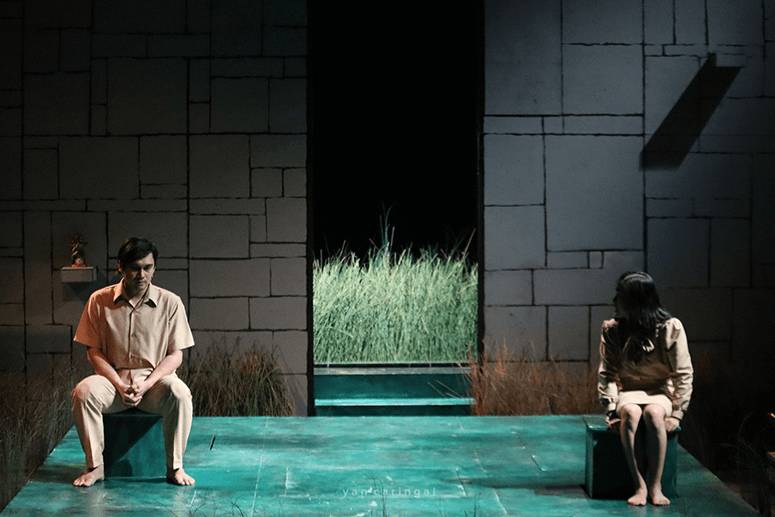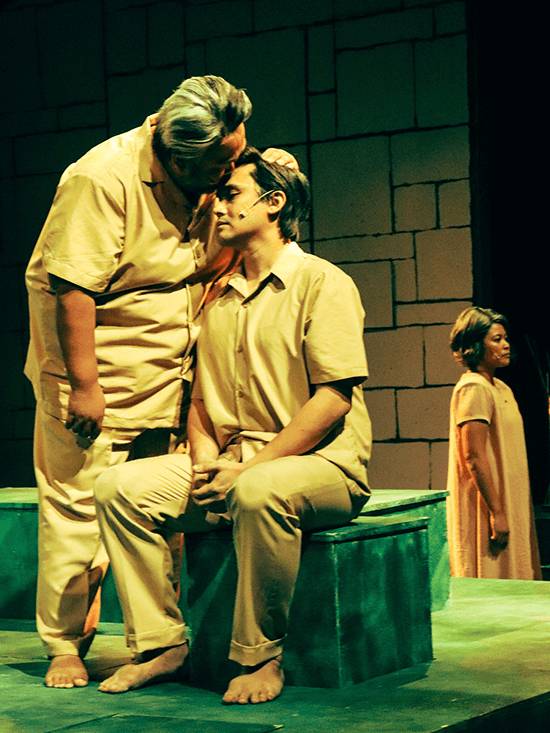‘Kisapmata’ an allegory of terror and transgression
Kisapmata, the 1981 film of Mike De Leon based on The House on Zapote Street, Nick Joaquin’s crime story of the real-life familicide of the Cabadings, made such a mark in the cultural landscape that when Tanghalang Pilipino announced last year that a stage adaptation was to be written by Guelan Luarca who was also slated to direct it, theater afficionados could not contain their excitement. The journey from film to stage is not always a smooth one. Fortunately, Luarca was able to navigate its path skillfully to create a piece that gives it immediacy and a new life of its own.
Luarca achieves this through a distillation of the story down to the essential. It’s like going back to the roots of theater—a modern Greek tragedy, if you will. Even the amphitheater is simulated, with video screens surrounding the audience, flashing dates and times of day like a countdown to the day of slaughter. The film’s 1960s suburban home has been deconstructed by set designer Joey Mendoza to a raised platform with cubes for furniture and a backwall of geometric patterns recalling crazy-cut adobe. Just like in the submerged sala of the period, the layout affords a good view of comings and goings in the house, which serves the patriarch Dadong (Jonathan Tadioan) well as he keeps a tight leash on his wife, Dely (Lhorvie Nuevo-Tadioan), their only child, Mila (Toni Go-Yadao) and her husband (Marco Viaña). Traditionally a place for the family to have convivial conversation, the “sala” has been turned by Dadong into a seat of power from where he reminds everyone, “Batas and Pagmamahal.” His “love” for them and for preserving the family as a unit is sacred, justifying his curtailment of their freedom as well as the physical and psychological abuse he subjects them to.

Dely acts as the chorus, commenting on the action—a device that the playwright employs together with narration from the characters that helps to clearly tell the riveting story while moving the action forward efficiently in a 90-minute, no-intermission run.
This approach works only with competent actors in synergy, which the TP Company has achieved after many years of acting together. It helps that they have worked with Luarca in the past including last year’s Nekropolis which won 4 Gawad Buhay Awards including Outstanding Play.
Tadioan portrays the treacherous Dadong with a calm, mirthful demeanor punctuated with an avuncular guffaw that has an unnerving quality— an insidious façade that actually makes him more menacing when coupled with the moments of silence that heighten the tension and the chilling horror of what’s going on in his warped mind.
We actually need not go so far as the ‘70s since recent history has shown to have a reign of terror of its own, with the extrajudicial killings in the drug war of the past administration.
Go-Yadao brings to the surface all the conflicting emotions of Mila: a love for her father but also a wish to escape; a love for Noel but still feeling guilt about his plans for them to ghost her family.
Viaña deftly manages the transformation of Noel from loving partner and obedient son-in-law to an enraged husband who attempts to rebel against Dadong’s practically holding them as prisoners in the house.

Nuevo-Tadioan plays Dely as someone with a profoundly traumatized demeanor who has accepted her fate. She knows that there is no changing her husband and all of them just have to follow his wishes or face the inevitable. She advises her daughter to just breathe and whisper it to the wind, but the “it” is so grave as revealed by Dadong who insinuates that he has a right to the child that Mila is carrying in her womb.
It is such a shocking revelation that you wonder why even the mother could not stop the abuse but then all of them have been caught in this web of the father’s tyranny, swindled by his using “love” and family as an excuse for transgressions, actually enabling him and being complicit, thinking that their prayers at the family altar are enough to wash the sins away.
Just like in the film that was styled as an allegory of the martial law years, the play likens Dadong to an autocrat who justifies the curtailment of freedom and the arrest and execution of dissenters with his “love” for the nation: Maintaining peace and order is good for the economy and for progress which will benefit the people in the long run. To keep everyone in check, he instills fear just like Dadong, by using brute force.
We actually need not go so far as the ‘70s since recent history has shown to have a reign of terror of its own, with the extrajudicial killings in the drug war of the past administration, now set to go on trial in The Hague with the arrest of the previous president. It’s a culture of violence that Kisapmata calls attention to. One may ask why violence has to be staged when we are already witness to it in our day-to-day lives but Luarca believes that “with the world entering some form of stasis—even regression—by turning to fascist and authoritarian leaders, it is not enough to say something is bad, there is a need to remind people and shock them out of complacency.” The play did just that, as it brought to life the horror and devastating consequences of an autocratic patriarch’s transgressions.
* * *
Kisapmata is showing until March 30 at the CCP Black Box Theater. Tickets at Ticket2Me. Follow @tanghalang.pilipino on IG.


